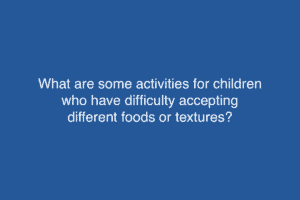
Hello Exceptional Lives’ friends. The first question I wanted to respond to was from Abby. Abby was wondering about some summer activities to support children with difficulties accepting different foods or textures.
And summer is really a great time to work on feeding and textures in general, because there are generally other siblings at home, and food or textures can be experienced more socially, and in fun places that are kind of novel to the child. So like outside in a treehouse, or in a play pool, or during an outdoor movie event, you could have new foods that the child might be able to sample. You can be messier in the summer, you can use more novel ways of getting clean. So we could take the dinosaurs and give them a bath with shaving cream. In the pool outside, we can fill the pool up with water beads, or run our water beads through our marble works activities. So, there are lots of different new things and novel ways you can experience them in the summer. My favorite methods for supporting kids with texture aversions specifically related to eating come from the SOS approach. So I would really encourage you to google SOS feeding. There’s a really great website with lots of more support, and guidelines, and ideas for therapists who are really interested in supporting feeding, specifically. Generally, my rule is, that when I’m working on feeding with a child, I try to really make that child feel as in control of the food, or the texture that they’re having a hard time with, as possible. First, just getting them to the point where they’re able to tolerate it, and you can do this by making that texture, that food item, something fun. The SOS approach actually encourages you to play with the child, with the food, so that it’s not something that has this negative tag associated with it. But it can, like we said before earlier today, really, that negative tag can be flipped into a more positive tag, because the child will have new, more positive associations with experiencing that texture, or that specific food item. But through touching it, and playing with it, eventually the child gets from the point of being able to tolerate that texture, being close, to the point where they might even touch it for a minute, even if it’s just to shove it away. Or they might then take it and play with it in their hands, or they might take it and sniff it, and then eventually they may get to the point where the child is willing to accept it into the mouth, even if they reject it initially. So we’ve got to kind of break it down into tiny, tiny, micro pieces of progress. We got to break it down into tiny steps for them. Think about all the different sensory aspects that feeding, and playing with textures, requires from a child. All the tactile, and proprioceptive, the smell; there’s so many different sensory aspects of feeding in addition to all the emotional aspects of feeding for parents and for children. So if you have a child who really is demonstrating a decreased number of foods that they’re able to tolerate, instead of an increase, and you have real concerns about that child’s ability to gain weight, or you know, you’re concerned about them from a medical standpoint, I certainly would reach out to a speech-language pathologist or an occupational therapist in your area, who has some additional expertise in feeding. But, thank you for the question!



